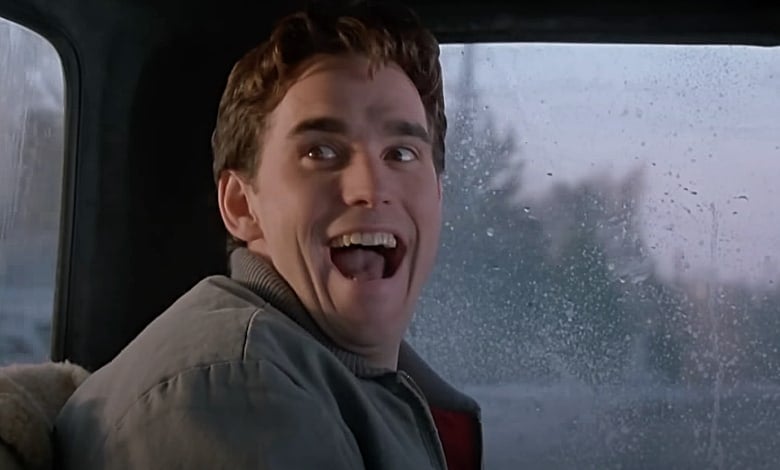There’s a growing list of stories that Hollywood would never tell again.
“Blazing Saddles” shoots to mind, but so do “The Producers,” “Soul Man,” “I Now Pronounce You Chuck and Larry” and “The Toy.” (The last entry, to be fair, makes sense)
Add “Beautiful Girls” to that growing list.
The 1996 ensemble tells uncomfortable truths about the male mind from start to finish. A key subplot involving a precocious 13-year-old girl wouldn’t make it past the first draft in 2024.
Even the actress who played her agrees.
Yet “Beautiful Girls” remains wise, elegant and quietly hilarious. That a movie with so much going for it couldn’t be produced now speaks volumes.
Timothy Hutton stars as Willie, a big-city pianist coming home for his high-school reunion. The old gang welcomes him back, including snow plow drivers Tommy (Matt Dillon), Paul (Michael Rapaport) and Kev (Max Perlich).
Willie is at an emotional crossroads, and he hopes going back to his roots will light his path forward.
Bad idea.
Nothing changes in the fictional Massachusetts town where the story is set. His old buddies are similarly stuck, most unable to forge adult relationships.
Paul pines for supermodels rather than process the end of his relationship with Jan (Martha Plimpton). Tommy can’t stop cheating on his beautiful, sympathetic girlfriend Sharon (Mira Sorvino). And everyone comically laments how Mo (Noah Emmerich) got “stuck” with a wife and kids.
So why does Mo look so happy?
‘Beautiful Girls’ premiered in theaters 27 years ago, February 9, 1996 pic.twitter.com/tHJJHqgmPL — RetroNewsNow (@RetroNewsNow) February 10, 2023
A stunning stranger (Uma Thurman) sets the boys’ tongues wagging, and a pre-teen with an old soul (that’s a young Natalie Portman as Marty) flummoxes Willie.
“Beautiful Girls” boasts plenty of moving parts, but director Ted Demme never loses control of the plot or the big picture. It’s a treatise on manhood – the immature instincts, carnal cravings and lust for something new.
It’s hardly a dude-bro portrait. These men are by and large pathetic, but we’re almost always in their corner.
Paul lacks the maturity to commit, fearing someone prettier is lurking around the corner. When love slips through his fingers he all but howls at the moon.
Why would Tommy even look at his old flame (Lauren Holly) when Sharon is by his side?
And then there’s Willie, who seems to have it all yet can’t help but wonder what kind of woman Marty will be someday.
Is that creepy? Yes and no.
Men can’t stop seeking new challenges, and fresh ways to explore love. For Willie, young Marty is the future woman, the person who will come into his life after he commits to his safe, steady girlfriend (Annabeth Gish).
His attraction to Marty isn’t sexual. It’s a complex fantasy tied to fear of commitment.
As Scott Rosenberg’s astute screenplay later notes, somewhere a man is wishing he could be with the girl you have right now.
A woke “Beautiful Girls” reboot would be almost unrecognizable. The story would constantly kick our protagonists when they’re down, adding so many “girl power” asides to show us what we see for ourselves.
Tommy gets his comeuppance late in the film, but it’s both organic and earned. No lectures, please. Life has a way of delivering them without a syllable.
These young men are real, raw and unshaped. They’re in their late 20s, and they still have some growing up to do. White privilege? Surely you jest.
They’re not deified or attacked for who they are. That’s just reality, and woke is the enemy of truth.
FAST FACT: “Beautiful Girls” screenwriter Scott Rosenberg may have the most eclectic resume in Hollywood. “Girls” proved his most consequential early credit, but he went on to pen “Con Air,” “Gone in 60 Seconds,” “Kangaroo Jack” and “High Fidelity.”
Women get little overt say in the story but they still matter. Sharon is an emotional punching bag, but she’s hardly the first woman willing to overlook a chronic affair. Tommy’s lover (Holly) is portrayed as a succubus, eager to ignore her marital bonds for quick, meaningless sex.
Rosie O’Donnell interrupts the story for overt commentary on male flaws, the closest thing “Beautiful Girls” has to a modern-day lecture. Her sass and brief screen time make those scenes digestible.
Thurman is idealized beyond reason. She’s stunning yet approachable, loves whiskey and is willing to flirt with Paul to make his ex jealous. Thurman’s performance is spotless, another way “Beautiful Girls” exposes the male mind.
She’s the supermodel Paul can’t stop thinking about. And, of course, he blows his chance with her.
The main male characters in “Beautiful Girls” are funny and flawed, relatable but stubborn in their groupthink. They learn and grow a little before the story wraps, but they’ll be making the same mistakes a few more times before long.
That’s life. That’s what Hollywood once recognized before the Thought Police arrived on the scene.
The post ‘Beautiful Girls’ Couldn’t Be Made Today. Here’s Why appeared first on Hollywood in Toto.

